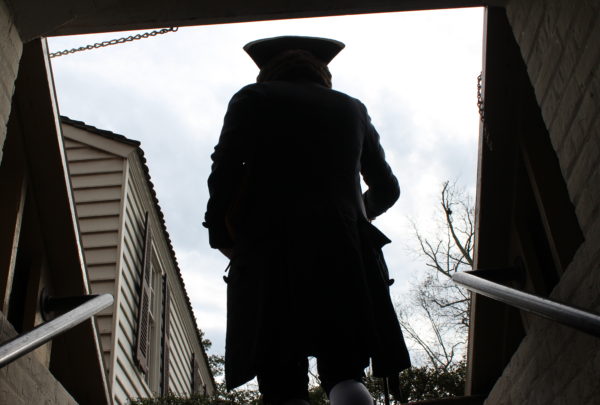
George Mason seems to want to be left alone, but that’s not an option for me. As Colonial Williamsburg’s newest Nation Builder, it is my task is to learn all I can about this “forgotten founder.”
Anyone’s story can become altered through time, warped by legend, or entirely lost to obscurity. It’s our job to peel back the years and pore over surviving details to reveal the truth of these people through their writings and actions long since recorded.
Getting beyond a superficial level of understanding is the obligation of every historian, but there is an added weight when you intend to “become” this person. There are multiple levels of responsibility: becoming academics, as expert scholars on our subjects; directors, as we script new programs; and actors, whenever we use our interpretive skills to bring these giants of history back to life.
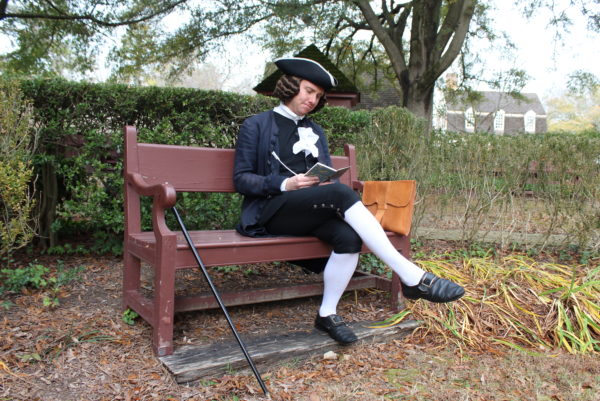
Familiarity can be a blessing and curse for historical interpreters. Obviously Americans know George Washington, but it can be hard to parse fact from legend. They may be familiar with Thomas Jefferson, but they know his quotes better than the man. James Madison may be synonymous with the Constitution, but that neglects his own changing opinions and nuanced views of government.
For one who is lesser known, a blank slate in the public consciousness, there is an opportunity to teach something new. That’s why I was thrilled when I heard that Colonial Williamsburg was looking for a George Mason, a man vital to Virginia’s (and then America’s) history who has long been neglected.
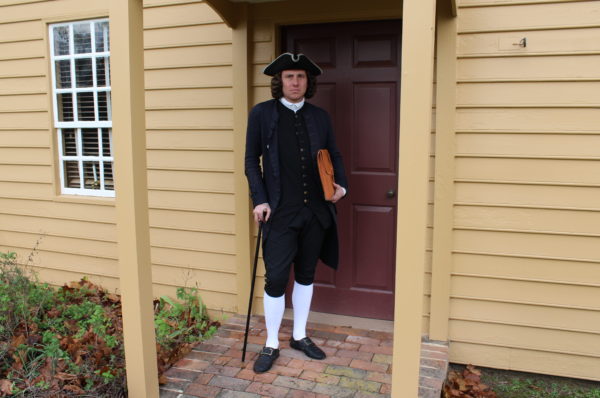
George Mason IV of Gunston Hall was a mixture of typical Virginian and unique persona (the “typical” Virginian combining possibilities of fortune with harsh reality). At 10 he was orphaned, not an uncommon occurrence in that uncertain era, but he would prove himself by becoming one of the richest men in Fairfax.
He lacked a formal education outside the occasional tutor but was sought far and wide for his political and legal opinions. He had a large family (nine of 12 children would survive to adulthood) and loved his first wife but felt the all-too-familiar tragedy of loss, which instilled in him a constant desire to protect his posterity. He measured his own life by his children and family, but history would remember him for other reasons.
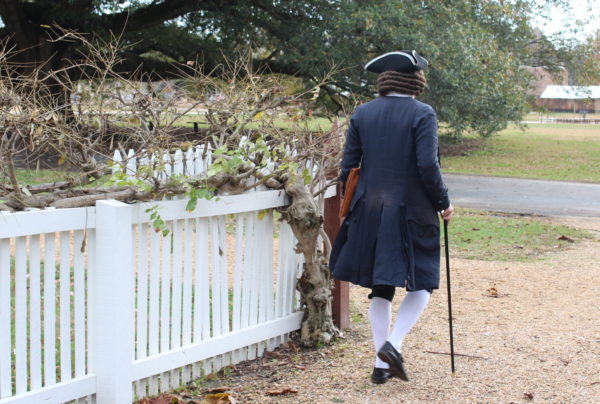
The name George Mason is unknown to so many Americans, and yet, in his own time, he was sought out and respected by many of those we recognize as synonymous with our Revolution. He was a friend of George and Martha Washington and a neighbor to their home at Mount Vernon. Thomas Jefferson described him as “a man of the first order of wisdom” with an “expansive mind, profound judgement.” And James Madison described him as “the ablest man in debate” he had ever seen.
Mason is perhaps best known for writing Virginia’s Declaration of Rights for Williamsburg’s Fifth Virginia Convention in June 1776. Its echoes resounded through the Declaration of Independence and, later, the federal Bill of Rights. He spent a majority of his life at his home, Gunston Hall in Fairfax, Virginia, because he preferred the “the happiness of independence and a private station to the troubles and vexations of public business.”
Mason came out of retirement repeatedly to serve his country when he was needed the most. He was one of the five most frequent speakers at the Constitutional Convention and one of only three who refused to sign the document upon the conclusion of that convention. And yet, people know the school named after him better than they know the namesake.
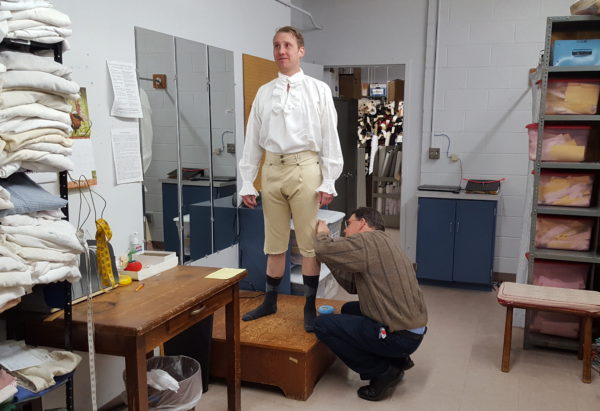
My appreciation goes deeper. For the past 5 months I have immersed myself in the history and style of this man. Though he is not the most popular founding father, there are still multiple biographies, each with its own perspective. The Complete Papers presents Mason in his own words, but useful insights can be hidden amidst the mundane business of daily life.
To this add the books and treatises that Mason read as well as academic writings that illuminate the sometimes dense history in all of its Constitutional and philosophical nuance.
This man was known in his own time for being reclusive and curmudgeonly, but when you read his words, you realize his genuine aversion to public notoriety was due to his love for his family first and foremost. His hesitation to leave his home did not lead to a limited understanding. Instead, he found wisdom by finding a balance between the best aspects of the old order and the progressive philosophy of the future.
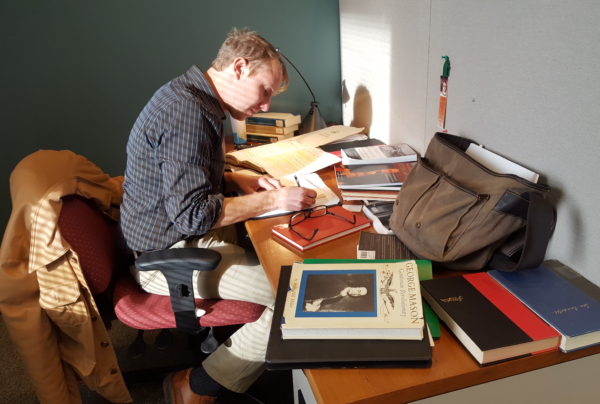
I have treasured the time that I have spent with Mason thus far and look forward to sharing him with you, our guests, in the near future. He is a complex figure in history and a relatively untapped voice from the pantheon of Founders. My studies have begun but there is still so much more to research. My reading list only gets longer and for every book I finish, I discover two more.
What we do here is new and constantly evolving. Unlike the academic, the director, or the actor who ultimately must step away from the culmination of their work, my study of George Mason will never be complete. But I’m looking forward to continuing my research this winter, introducing him on the streets this spring, testing his wits against Mr. Jefferson in new programming, and ultimately bringing this great man to life for our visitors.
GUEST BLOGGER: JOE ZIARKO
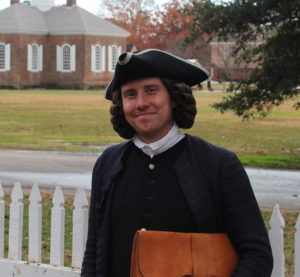
Joe Ziarko’s first stint at Colonial Williamsburg began nine years ago, shortly after he graduated from Dickinson College with a double major in American History and Theatre. He began as a theatrical interpreter, a logical extension of his “unique” educational combination.
As a member of our actor Interpreter team, Joe portrayed Edmund Randolph for several years. Coincidentally, Randolph, like Mason, refused to sign the Constitution. Joe says this is where he discovered a particular propensity for portraying less appreciated historical figures
After serving as Manager of Interpretation at George Washington’s Ferry Farm in Fredericksburg, Va. the past two years, Joe returned to Colonial Williamsburg to take up the role of George Mason in August 2016.
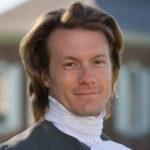
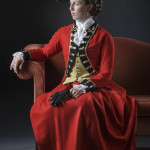
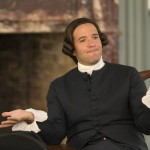
Joe:
I am writing a major mew biography of George Mason that will be published by Yale University Press next year.. If you get a chance, send me an email and we can connect. whyland99@yahoo.com
Bill HYland
I grew up down the road from George Mason’s Gunston Hall, and attended George Mason University. His story is a fascinating one, and I urge others to visit his home if they have a chance. His home and grounds are beautiful, as is the surrounding area. Pohick Park is nearby, along with Pohick Church, which was attended by George Washington.
I certainly have enjoyed our many conversations in the Rockefeller Library. Your dedication and passion for history is both obvious and contagious. I look forward to seeing you perform. We will be the beneficiaries of all your hard work. Thanks for all that you do.
As someone who graduated from George Mason University and currently works at the home of one of George Mason’s ancestors, I’m extremely excited to see George Mason venturing around Colonial Williamsburg! I can’t wait to speak with him when he arrives!
History is written by the victors…many lies have been forced upon us by the elite. Light reveals truth, and we are NOW receiving the highest density of LIGHT on Earth than we have ever witnessed. Times are a changing…without the use of time travel, it’s hard to know if each written word is true or false, but mostly false lies of the elite!
It is very good to see the addition of George Mason to the cast of characters in CW.
He may have been somewhat forgotten, he was certainly known and not forgotten to the “founding fathers”.
For complicated reasons some founders were brought to the forefront in history classes and books, and others set to the back. Not always was that due to the importance and influence they carried.
Great blog post and what a great opportunity to help bring to light this amazing individual Toured Gunston Hall with a good friend and we both really added to what we knew about this remarkable founder. Hope to meet Mr. Mason in the future at CW.
I graduated from George Mason High School in Falls Church, Virginia so am already acquainted with this particular founding father. To your readers, I highly recommend a visit to Gunston Hall. I attended a teacher’s workshop there this past summer which I enjoyed very much. Mason was a fascinating man - I especially appreciate his devotion to his family.
We were honored to hear George Mason at his second appearance at the St. George Tucker House recently. While both my husband and I had heard of George Mason and did know he wrote Virginia’s Bill of Rights, we learned so much more during the time spent with him at the Tucker house. We are looking forward to returning to CW and hearing more from the newest Nation Builder.
Would love to see a program with Thomas Jefferson and with James Madison where the discussion of the need for a Bill of Rights is explored.
Mr. Mason certainly sounds like a person people need to know about. There are so many that are not as notable as the others but are very note-worthy. Thank you for delving into Mr. Mason. Looking forward on my next visit to seeing him. After over 70 visits to CW, I always learn something new and for that I am grateful. Thank you for never forgetting how American came about.
We look forward to your interpretation and your wit-to-wit dialogue with other interpreters especially T Jefferson. I can see a packed house for every program where two or more Nation Builders are working together. Good luck.
It’s. wonderful that a ” forgotten” founder is being rediscovered and George Mason is an excellent choice. Kudos to CW. Someday, it would be great to see Richard Henry Lee (and his brothers) brought back as well.
Good job, Bill (and Joe). You and your readers might also enjoy our take on the Forgotten Founder, which I recorded on a visit to Gunston Hall: https://www.podomatic.com/podcasts/ywc/episodes/2013-07-06T05_55_28-07_00